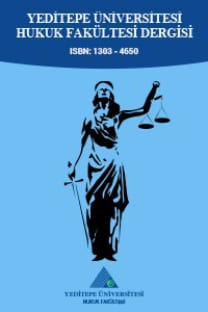ULUSLARASI HUKUKTA SOYKIRIM KAVRAMI VE HOLOKOST'UN YERİ
Holokost kavramı, II. Dünya Savaşı sonrasında ortaya çıkan soykırım kavramı ve terimi çerçevesinde, özellikle Nazi ve işbirlikçileri tarafından geniş ölçülerde gerçekleştirilen soykırımsal fiilleri tanımlamak için ortaya çıkmış bir kavramdır. Holokostun, diger soykırım ve insanlık aleyhine suçlarla karşılaştırmalı olarak incelenmesi, soykırımsal fiillerin oluşumu ve gelişimi bakımından izledikleri süreç ve ortak kalıpların belirlenmesinde önemli rol oynamakta ve gelecekte gerçekleşmesi muhtemel soykırımları da bu benzerlik ve farklılıkların ortaya konulması ve belirlenmesi ile önlemek mümkün olabilecektir. Holokostun tanımlanması ve ortaya çıkışı, uluslararası hukukun gelişimi bakımından da önemli bir adımdır. Bu tarihten sonra modern dünya düzeninde, uluslararası mahkemeler oluşturulmuş ve bu fiiller karşısında uluslararası alanda soykırımsal faaliyetlere karşı cevap teşkil eden hareketler ortaya çıkmıştır. Tarihi hafızada rol oynayan soykırımların holokost ile bağlantılı olarak değerlendirilmesi ve genç zihinleri potansiyel soykırımlar ve insanlık aleyhine suçlara karşı uyarmakta ve bu konudaki sorumluluklarını ve rollerini anlamaları bakımından farkındalık yaratmaktadır. Uluslararası adalet duygusunun yaratılması ve karşılanmasında ise uluslararası örgütler ve yargı organları önemli bir rol üstlenmiştir.
(THE CONCEPT OF GENOCIDE IN INTERNATIONAL LAW AND THE HOLOCAUST)
This article about Holocaust is rationale for a comparative study that relates the Holocaust to other genocides and crimes against humanity while providing an overview of possible pitfalls to be avoided. An exploration of the relationships between the terms "Holocaust", "Genocide", "war crimes", and "crimes against humanity". An introduction to the origin of the term genocide, coined by Raphael Lemkin during the Second World War, its incorporation into international law, and a number of alternative definitions that have been offered by scholars. An outline of developments in international law and institutions aimed at the Prevention and Punishment of Crimes Against Humanity. The Holocaust is often considered to have given rise to our conceptualisation of the term "genocide", which was coined during the Second World War, in large measure as a response to the crimes of the Nazis and their collaborators. So the Holocaust may constitute a starting point and the foundation for studying genocide. In comparing the Holocaust to other genocides and crimes against humanity it should be possible to sharpen understandings not only of similarities between events but also of key differences. In so doing, it may be an opportunity to better understand the particular historical significance of the Holocaust, and how study of the Holocaust might contribute to our understanding of other genocidal events.
___
- Kitaplar
- Jean Paul Sartre, "On Genocide", Crimes of War, ed. By. Richard A. Falk, Gabriel Kolko, Robert Jay Lifton, New York, 1971.
- O. Kadri Keskin, "Jenosid Suçu ve Jenosid Sözleşmesi", Adalet Dergisi, Eylül-Ekim 1986, Sayı:5.
- Willianm A. Scahabas, Genocide in International Law, Cambridge Univer- sity Press, Cambridge, 2000.
- Herbert Hirsch, Genocide and the Policy of Memory, Studying Death to Preserve, The University of North Caroline Press, London, 1995.
- Patricia M. Wald, 'Genocide and Crimes Against Humanity', Washington University Global Studies Law Review, Vol.6, 2007.
- Enver Bozkurt, Türkiye'nin Uluslararsı Hukuk Mevzuatı, 2. Baskı, Nobel Yayınları, Ankara, 1999.
- Benjamin A. Valentino, Final Solutions: Mass Killing and Genocide in the 20Th Century, Cornell University Press, Ithaca, London, 2004.
- Hüseyin Pazarcı, Uluslararası Hukuk, 2. Bası, Turhan Kitabevi, Ankarara, 2004.
- Benjamin A. Valentino, Final Solutions: Mass Killing and Genocide in the 20Th Century, Cornell University Press, Ithaca, London, 2004.
- Resolutions adopted by the UN General Assembleyduring it's twenty- seventh session, 18 December 1972, "Principles of International cooperation in the detection, arrest, extraditon, and Punishment of persons guilty of war crimes and crimes agints humanity",
- http://daccessdds.un.org/doc/RESOLUTION/GEN/NR0/270/50/IMG/NR0 27050.pdf?OpenElement Diğer Kaynaklar
- Ana Britannica, 1994, C. 31, 15. Bası, İstanbul.
- Türk Dil Kurumu Sözlüğü.
- ISSN: 1303-4650
- Başlangıç: 2004
- Yayıncı: Yeditepe Üniversitesi adına Prof. Sultan Tahmazoğlu Üzeltürk
Sayıdaki Diğer Makaleler
CUMHURBAŞKANI BAKANLAR KURULUNA BAŞKANLIK EDEBİLİR Mİ?
TOPLU YAPILARDA YÖNETİCİ / YÖNETİM KURULU
ASKERİ UÇAK VE HELİKOPTERLERİN DÜŞMESİNDEN DOĞAN ZARARLARDAN İDARENİN SORUMLULUĞU
AYIPLI MALDAN KAYNAKLANAN SORUMLULUK VE UYGU
CEZA HUKUKUNDA NEDENSELLİK BAĞI
İDEALİST VE MATERYALİST FELSEFİ DÜŞÜNCEDE MUTLAK SİYASAL DOĞRU
TÜKETİCİLER, VERGİLER VE HAYALLER
